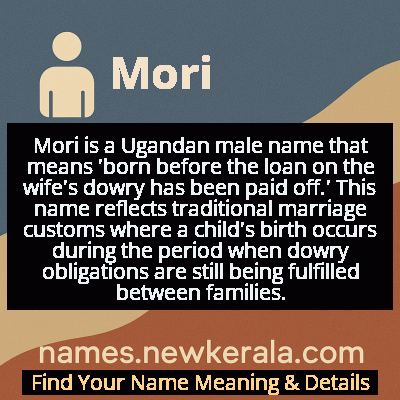Mori Name Meaning & Details
Origin, Popularity, Numerology Analysis & Name Meaning of Mori
Discover the origin, meaning, and cultural significance of the name MORI. Delve into its historical roots and explore the lasting impact it has had on communities and traditions.
Name
Mori
Gender
Male
Origin
African
Lucky Number
1
Meaning of the Name - Mori
Mori is a Ugandan male name that means 'born before the loan on the wife's dowry has been paid off.' This name reflects traditional marriage customs where a child's birth occurs during the period when dowry obligations are still being fulfilled between families.
Mori - Complete Numerology Analysis
Your Numerology Number
Based on Pythagorean Numerology System
Ruling Planet
Sun
Positive Nature
Leaders, ambitious, highly driven, self-reliant, innovative.
Negative Traits
Overly aggressive, domineering, impatient, selfish.
Lucky Colours
Red, orange, gold.
Lucky Days
Sunday.
Lucky Stones
Ruby, garnet.
Harmony Numbers
2, 3, 9.
Best Suited Professions
Entrepreneurs, managers, engineers.
What People Like About You
Courage, determination, leadership.
Famous People Named Mori
Mori Ougai
Japanese novelist and physician
One of Japan's most prominent literary figures during the Meiji era
Mori Calliope
Virtual YouTuber and musician
First English-speaking VTuber from Hololive and successful music artist
Mori Ranmaru
Samurai warrior
Famous loyal retainer of Oda Nobunaga in Japanese history
Mori Ōgai
Army surgeon and translator
Introduced Western medicine to Japan and translated European literature
Name Variations & International Equivalents
Click on blue names to explore their detailed meanings. Gray names with will be available soon.
Cultural & Historical Significance
The name reflects the cultural importance of completing social contracts and the recognition that family bonds extend beyond immediate nuclear families to include broader kinship networks. In traditional contexts, the dowry payment wasn't merely a financial transaction but a symbolic gesture establishing lasting relationships between families. A Mori child represents the continuation of these relationships even as the formal obligations are being fulfilled. This naming practice demonstrates how personal identities in many African cultures are deeply intertwined with social structures and family histories, creating a rich tapestry of meaning that connects individuals to their cultural heritage and community values.
Extended Personality Analysis
Individuals named Mori are often perceived as having personalities shaped by the name's unique meaning of being born during a transitional period of family obligation. They may be seen as patient and understanding individuals who recognize that some things in life require time and commitment to resolve. The name's association with waiting for obligations to be fulfilled suggests a personality that is comfortable with process and understands that meaningful relationships and achievements often develop over time rather than instantly. These individuals might exhibit strong family values and a sense of responsibility toward maintaining social bonds and honoring commitments.
The cultural context of the name implies someone who appreciates tradition while navigating modern life, potentially making them diplomatic in family matters and respectful of cultural heritage. They may demonstrate resilience and the ability to thrive even when circumstances are not fully settled, showing adaptability while maintaining core values. The name's meaning might also suggest someone who serves as a bridge between different parties or perspectives, much like how the child bridges the period between dowry agreement and fulfillment. This could manifest as strong mediation skills, emotional intelligence, and the capacity to understand multiple viewpoints while working toward harmonious resolutions in personal and professional relationships.
Modern Usage & Popularity
In contemporary times, the name Mori maintains its traditional significance in Ugandan communities while also gaining broader international recognition through globalization and diaspora populations. While it remains relatively uncommon outside specific cultural contexts, there's growing appreciation for African names with deep cultural meanings. Modern usage sees Mori employed both as a given name and occasionally as a surname, with some parents choosing it to honor cultural heritage or for its distinctive meaning. The name's popularity remains modest but stable within Ugandan communities, where it continues to serve as a meaningful connection to traditional marriage customs and family values. In urban areas and among younger generations, the name might be chosen more for its unique sound and cultural resonance rather than strictly for its original dowry-related meaning, reflecting how traditional names evolve while maintaining cultural significance.
Symbolic & Spiritual Meanings
Symbolically, Mori represents the concept of transitional states and the beauty found in processes rather than just outcomes. The name embodies the idea that life's most meaningful moments often occur during journeys rather than at destinations, symbolizing patience, commitment, and the understanding that valuable relationships require ongoing investment and care. Metaphorically, Mori can represent the bridge between past obligations and future fulfillment, serving as a reminder that our present circumstances are often shaped by historical agreements and cultural traditions. The name also symbolizes hope and continuity, as the child represents the future while being born during the completion of a significant family agreement, speaking to the interconnectedness of generations and the way family bonds transcend individual moments in time.

